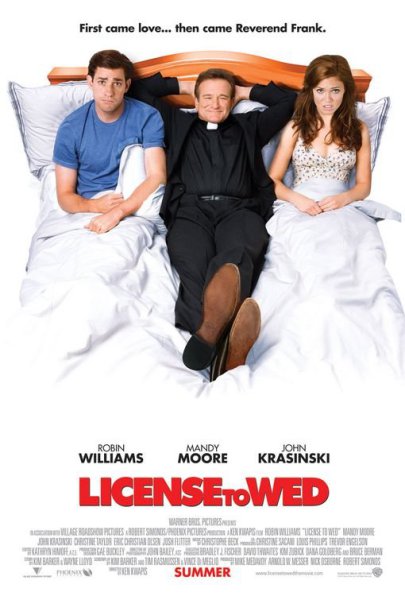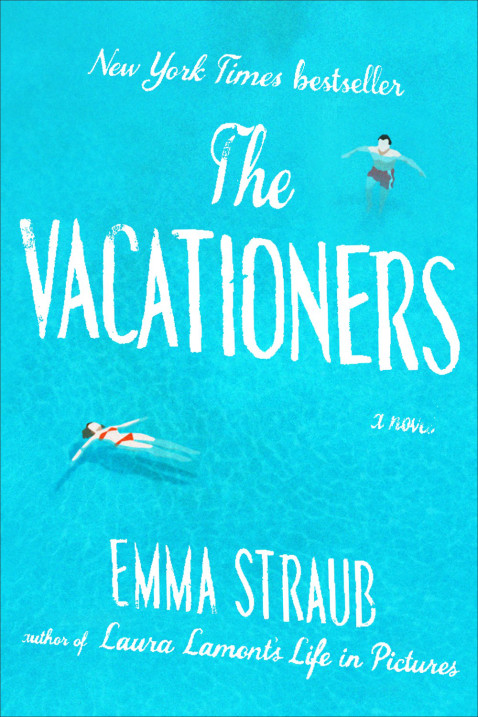
License to Wed
Dir. Ken Kwapis
Premiered July 3, 2007
Robin Williams was a huge presence in my childhood, towering over the 1990s with his unique combination of rapid-fire schtick and gentleness. But Williams was kind of like bacon: put him in an existing project and you’d get something memorable and fun, but try to build it around him and you’d get something obnoxious and gross. Let’s be honest: for every great performance he put into Aladdin or Good Will Hunting, there was at least one boneheaded star vehicle.
In the mid-2000s, Hollywood attempted to revive the patented Robin Williams Formula with three critically panned bombs. 2006 presented two flops from two Barrys: Barry Sonnenfeld’s RV and Barry Levinson’s Man of the Year; but the last and most widely reviled of these was 2007’s License to Wed.
Twentysomething entrepreneur Sadie Jones (Mandy Moore) has just accepted a marriage proposal from boyfriend Ben Murphy (John Krasinski) on the condition that they get married in the church built by her grandfather. Unfortunately, that church is presided over by the Reverend Frank Dorman (Williams), who will only marry the two on the condition that they submit to his wildly inappropriate marriage prep course. Ben is understandably put off by Frank’s behavior, while Sadie is mostly blinded by affection for her childhood pastor.
Reverend Frank is awful, constantly humiliating the young couple under the guise of testing the strength of the relationship. He has his child protégé plant a bug in their apartment, makes them take care of remote-control robot babies, and tries to get them to fight each other; and while the film seems to acknowledge Frank’s intrusiveness, it also takes his side. A more mature film might have portrayed Frank as a pushy but well-meaning figure, like a coach, but like previous Williams vehicle Flubber, the script takes things too far and makes him a rude, controlling bully.
More than anything, License to Wed reminded me of the Adam Sandler/Jack Nicholson film Anger Management. But instead of a rousing speech by Rudy Giuliani at Yankee Stadium (yes), this film ends in a version of Jamaica where the majority of men are Rastafarian and marijuana is legal and can be smoked on airplanes. There’s no point to any of this except to plug Sandals Resorts. I’m not the kind of guy who cries colonialism at things, but there’s no part of that digression that doesn’t gross me out.
You might surmise from that description that the movie is at least interestingly twisted, like an A-list version of the Christsploitation/unintentional horror film Old Fashioned, but you would be wrong. The script is full of moments that have the cadence of a joke, but no actual humor. The situations are tiresome; Ben’s typical dissatisfied married friend (DeRay Davis) makes me yearn for Paul Rudd in Knocked Up. And rather than let Williams improvise, as in the old days, his dialogue reads like a screenwriter’s plodding impression of Robin Williams improvising. Altogether, the writing, direction, and performances are so passionless and perfunctory as to rescue the film from the outright disgust that its premise would suggest. License to Wed may not be the worst 2007 film I’ve seen thus far, but it is unquestionably the least.
Signs This Was Made in 2007
Sadie’s older sister Lindsey (Christine Taylor) is unemployed and lives with her parents, and thus the film treats this as evidence that she is a selfish, contemptible dullard.
How Did It Do?
Despite being the last attempt to revive the long-expired Robin Williams Formula, License to Wed was the most successful, albeit not successful enough to warrant further efforts, as it grossed $69.3 million against a $35 million budget. The critical consensus was atrocious, earning a 7% fresh rating on RottenTomatoes, a degree of revulsion typically associated with incompetent, wildly misplaced ideas.
Mandy Moore had weathered bad movies before, and would continue to do so in her career, at least until landing the starring role in Disney Animation’s comeback Tangled. Her co-star Krasinski would not be so lucky; limited by years of more work on The Office and unsubstantiated rumors that he deliberately avoided villainous character-type roles would confine him to a handful of indie movies like Away We Go and Promised Land before going deeper into voice work. Robin Williams, meanwhile, continued working, most notably in Bobcat Goldthwait’s revelatory dramedy World’s Greatest Dad and short-lived CBS sitcom The Crazy Ones before his tragic death in 2014.
But the strangest career outcome has to be that of Ken Kwapis. Like Krasinski and several of the supporting cast, Kwapis worked regularly on The Office, but also had a long film career that could be described as “impressively dubious.” This would continue as he went on to direct He’s Just Not That Into You, Big Miracle, and to my special distaste, Robert Redford’s woefully butchered adaptation of Bill Bryson’s A Walk in the Woods.
Next Time: I Now Pronounce You Chuck and Larry
Advertisements Share this:




